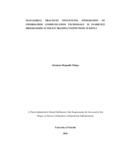| dc.description.abstract | The purpose of this study was to investigate the influence of administrators of police
training institutions managerial practices on integration of Information
Communication Technology (ICT) into in-service programmes in Kenya. The study
specifically examined the involvement of police officers by the college commandants
in the formulation of ICT policies, influence of instructional supervision on the
integrations of ICT in-service training, involvement of police officers in the
development of in-service programmes and finally the provision of ICT infrastructure
by college commandant to integrate ICT in in-service police training. The study
adopted a descriptive survey research design, study respondents were sampled the
respondents from a population of college administrators, instructors and trainees from
Kenya Police Training College Kiganjo, General Service Unit Training School and
the Directorate of Criminal Investigations Training School. The study targeted a
combined population of 885 comprising of 426 from Kenya Police College-Kiganjo,
326 from General Service Unit training school and 133 from Directorate of Criminal
Investigations. The respondents comprised of administrators, instructors and trainees
of the sampled police training institutions. Slovin’s formula was used to determine
sample sizes of instructors and trainees giving a combined sample size of 403
subjects. In addition purposive sampling method was used to select threes college
administrators as key informants from each of the three training intuitions. Primary
data was collected from nine college administrators who were purposively sampled
and 403 instructors and trainees, selected randomly from the three police training
institutions. Primary data from instructors and trainees were collected using
questionnaires while an interview schedule was used to collect data from the three
college administrators. Quantitative data were analysed descriptively using
frequencies while qualitative data was analysed through data reduction, data
discussion and drawing conclusions. Chi Square was used to test hypothesis to test the
significance relationship of ICT proficiency among the police officers and police
training schools. The findings on the contribution of involvement of instructors and
trainees in the formulation of ICT policies, instructional supervision, development of
in-service training programmes and provision of ICT infrastructure on integration of
ICT in police in-service training contributed very little to ICT integration. The study
recommends that police training colleges be made semi-autonomous in order to
provide the administrators with the leeway to make managerial decisions freely. The
findings were significant to the National Police Service, the Ministry of Interior and
National Police Service and all stakeholders in the development of policies that will
ensure that ICT is integrated into police in-service training. The study concludes that
the management of police training institutions have not influenced to a large extent
the involvement of the police officers on ICT policy formulation, formulation of inservice
programmes and supervision of ICT instruction. Also the provision of ICT
infrastructure has not to a large extent contributed to ICT integration in police inservice
training. | en_US |



